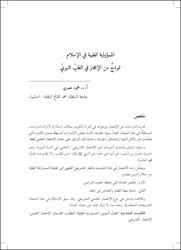المسؤولية الطبية في الإسلام نموذجٌ من الإعجاز في الطبِّ النبويِّ
Citation
MISRÎ, Mahmud. "المسؤولية الطبية في الإسلام نموذجٌ من الإعجاز في الطبِّ النبويِّ". Mecelletü Külliyyeti’l-Ulumi’l-İslamiyye, 2 (2020): 58-88.Abstract
كثرت الدراسات عن الإعجاز ووجوهه في القرآن الكريم، بخلاف السنَّة؛ إذ لا تزال الدراسات
المستقلَّة في هذا المجال قليلةً نسبيًّا. فقديمًا كانت بعض الإشارات البسيطة ضمن الكتب التي
تحدَّثت عن دلائل النبوَّة والشمائل وغيرها، وحديثًا كان التركيز على مجال الإعجاز العلميِّ فقط.
وسوف نتناول بالبحث أنموذجًا عن الإعجاز التشريعي / العلمي في السنة النبوية، وهو
حديث عمرو بن شعيب عن أبيه عن جدِّه عن النبيِّ صلى الله عليه وسلم قال: )من تطبَّب، ولا يُعلم منه طبٌّ،
فهو ضامنٌ(.
ويتمثَّل وجه الإعجاز في هذا الحديث بالنظر التشريعيِّ الفقهيِّ إلى قضيَّة المسؤوليَّة الطبِّيَّة
من خ لل أمرين مهمَّين: ا
الأول: تحقيق العدالة التي تحفظ حقوق المرضى.
الثاني: حماية مهنة الطبِّ والعاملين في حقله.
وكلاهما يدخل في نوع الإعجاز العلميِّ التشريعيِّ. وقد سبق الإس لمُ في هذا المجال ا
التشريعاتِ المعاصرةَ، وجاء بما لا يُزاد عليه من حيث المبدأ.
الكلمات المفتاحية: الطبُّ النبوي، المسؤولية الطبِّيَّة، التطبُّب، الضمان، الإعجاز العلمي،
الإعجاز التشريعي. Kuran-ı Kerimde İ’câz ve çeşitleri hakkında birçok çalışma yapılmış olmakla birlikte aynı şey hadisler için geçerli değildir. Zira hadisler hakkında yapılmış müstakil çalışmalar hala diğerine nispeten azdır. Eski kaynaklarda, Delâilu’n-nübüvve ve Şemâil kitapları içerisinde bazı metinler olmuş, modern kaynaklarda ise bilimsel i’câz ele alınmıştır.
Bu çalışmada Hadislerdeki şer’î/bilimsel i’câza örnek olarak Amr b. Şuaybın babası ve dedesi tarikiyle Hz. Peygamberden rivayet ettiği (Tıb ilmiyle ilgilendiği bilinmediği halde tabiplik yapan kimse (verdiği zararı) tazmin eder).
İşte bu hadisteki i’câz yönü, tıbbi sorumluluk meselesine fıkhî bakışla iki önemli açıdan tezahür etmektedir:
Birincisi: Hasta haklarını koruyan adâletin gerçekleştirilmesi.
İkincisi: Tıp mesleğinin ve bu alanda çalışanların korunması.
Bu iki mesele de şer’î i’câza girmektedir. İslam bu konuları modern kanunlardan çok önce vaz etmiştir ve İslamın getirdiğinin üzerine prensipte yeni bir şey konulmamıştır. The aspects of miracles in Qur’an have witnessed a huge attention and many studies. However, these studies witnessed a little attention in the Sunnah texts. Historical speaking, we can trace few places of these aspects in some books such as the books of prophetic traits and the proofs of the prophecy. In our modern time, the focus was mostly on the scientific aspect of this field.
This paper attempts to study a sample of a scientific/legal miracles of prophetic Sunnah using the following hadith: ‘Amr b. Shu’ayb narrated from his father, from his grandfather that the prophet said: “whoever practices a pseudo medicine, he would be a warrantor”
The miraculous aspect in this hadith, in terms of legal approach to the medical responsibility, can be represented through these two major points:
First: achieving justice which protects the rights of patients.
Second: protection of medicine profession and its labors.
Both of these points are included in the field of legal and scientific miracle. Islam, indeed, has preceded all of these temporary laws, and provided us with principles that go beyond what we need.



















